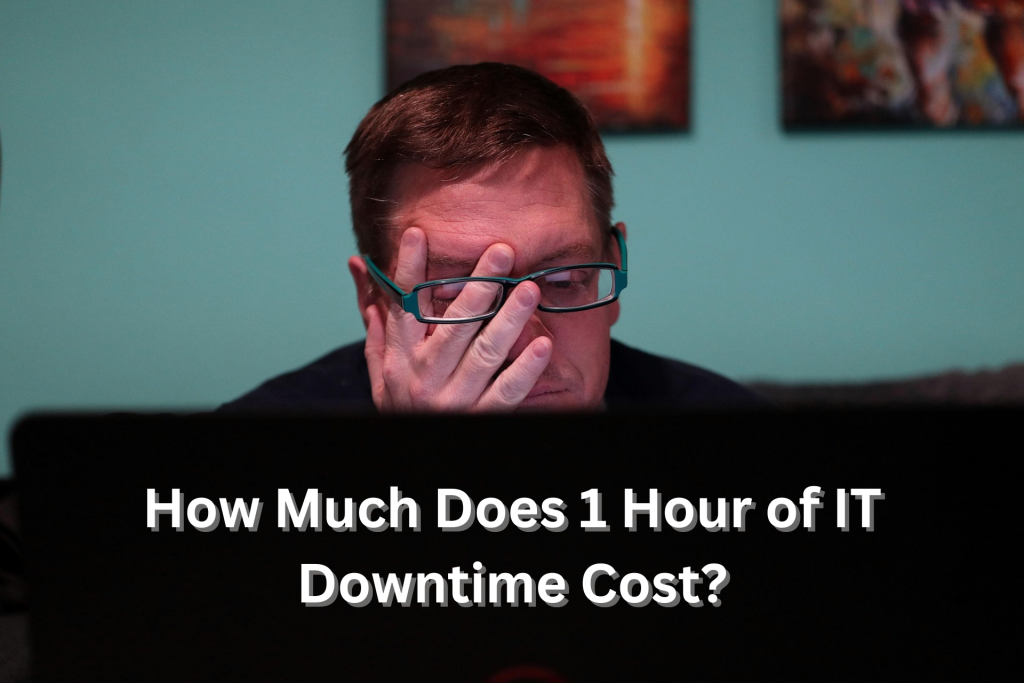Small businesses in Canada depend on consistent uptime to achieve production and profit targets. Therefore, in the event of an IT network systems collapse, the effects will be felt immediately and immensely. This is not just because sales come to a halt, it also includes loss productivity from employees despite being paid the same, and customers becoming unhappy and impatient. In order to determine the figures involved in downtime per hour losses, an IT downtime cost calculator Canada, might be used. This provides data that justifies why prevention is usually cheaper than cure.

How Much Does 1 Hour of IT Downtime Cost
The Financial Reality of Downtime
A pause in operation is not just a minor inconvenience. The cost of business downtime comes per minute. In Canada, a small business may lose thousands of dollars from downtime per hour out of service. It is lost revenue, wasted wages, and ultimately emergency repair bills, which take their toll on the bottom line. To owners, the fact remains the same: downtime is a curse to profit and reputation.
IT Downtime Cost Calculator, Canada-based SMBs
A simple formula to determine cost of downtime is:
Downtime Cost = (Lost Revenue + Lost Productivity + Recovery Expenses) × Duration
Although this calculation captures direct expenses, it does not account for covert and collateral impacts such as lost customer trust, legal issues, or damage to the brand’s reputation.
Sample Calculation
In Toronto, for example, a fashion store that typically brings in about $270 an hour can see sales vanish the moment the internet connection drops. This is because it affects payment systems, therefore, no transactions can be completed. And despite staff staying on the clock, folding clothes, and waiting for customers, revenue is on a halt. Hence, instead of earning $270, gets to spend more on repair and restoration. It also continues to spend nearly $200 on wages during that hour that should have seen profit but instead got into useless expenditure. If this is stretched across half a day, and more money is gone that can’t be recovered as soon as the moment passes. On top of this, customers may not return due to an unpleasant experience.
Hidden Costs You Didn’t Consider
The cost of business downtime runs beyond figures. The financial impact of downtime per hour can quietly accumulate, often going unrealized by the owners. Service interruptions often push customer loyalty toward competitors, making the impact even greater. Additionally, leads can disappear when questions are not answered. Moreover, these minor delays from lost productivity and services may result in fines that can be triggered by the SLA penalties.
Departmental Impacts: Sales, Operations, Support
Aside from the impact of downtime on the business, in general, departmental issues also arise. This needs to be identified so that the issues can be mediated or resolved. For the sales department, for example, this leads to missed calls from now-frustrated prospects. It also means deals leaking when it should have already been closed. The operations department, on the other hand, will experience stalled workflow, a break in the supply chain and the late arrival of shipments. Lastly, for customer support teams, they will expectedly experience growing queues, long waits, and slipping satisfaction. All these generate a chain effect. A single system failure can ripple throughout the business. A single system glitch can spread disruption across the entire organization.
Root Causes of SMB Downtime
In most cases, these disruptions stem from three primary causes. First, humans are committing mistakes as they update systems or misconfigure them. Second, would be the crashes into the hardware of older servers, routers, or devices. And lastly, cyber-attacks, including ransomware, phishing, or DDoS attacks. These may lead to a halt in operations. A minor inconvenience can leave SMBs broken and without proper IT protection.
Why Small Businesses Are More Exposed
Bigger companies usually maintain recovery strategies, backup solutions, and dedicated IT teams. On the flip side, most small to medium businesses (SMBs) do not. This comes from having limited resources that expose them to longer downtimes. A single server failure or security violation situation, for example, can cost days to resolve. Hence, making the loss more frustrating and adds to the financial strain. This is why managed IT services, ROI planning and proactive measures, are essential.
How MSPs Minimize Downtime
Managed Service Provider (MSP) lessens the risks and accelerates recovery. Their strategy consists of:
24/7 monitoring
This is to ensure that problems are identified before they get out of control.
Backups
Having this also guarantees fast restoration of data that are needed to resume operations as soon as possible.
DR or Disaster Recovery
Business continuity and disaster recovery planning are important. This ensures that business processes are operational even in the face of a disaster.
Such services justify the managed IT services ROI, particularly when measured against regular downtime expenses. A downtime ROI calculator typically demonstrates how prevention pays for itself.
Case Studies: Downtime in Real Canadian Firms
Although business details cannot be disclosed due to client privacy agreement, the numbers presented are accurate data from observing Canada-based businesses. In these cases, repair charges are much lower compared to the cost of downtimes. It is not always the damage, but it is always the financial loss.
- A law firm in Toronto had suffered losses of over 1000 hours of billable work from a half-day outage.
- A retailer in Vancouver Island lost $25,000 in sales over a weekend when systems went down during a peak season sale.
- A manufacturer in Edmonton was penalized by suppliers due to their delays. This was caused by a crash of their system that took a while to restore.
Why Prevention is Cheaper
An IT downtime cost calculator Canada brings the impact into the spotlight. Even a single hour of downtime has the potential to wipe out an entire week’s earnings. The more intelligent action is to avoid outages, rather than respond to them. To reduce the occurrence of such risks, most Canadian SMBs use services, such as EB Solution, to ensure that they are operable at all times. Monitoring, backups, and disaster recovery plans are used to ensure that the systems remain online, and operations flow relentlessly. They are aware that every dollar invested in prevention translates into a lot more uptime.
